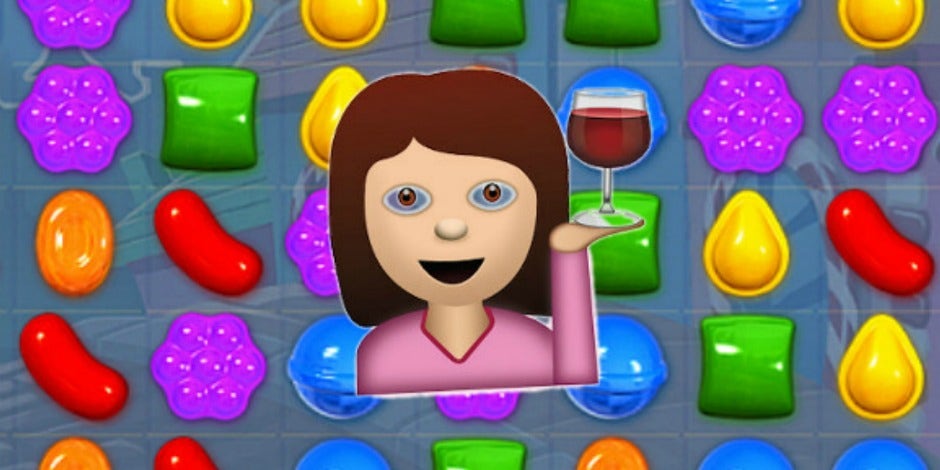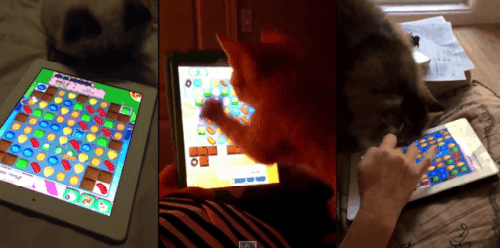The Surprising Way Candy Crush Gets Me Through My Ex's Ongoing Abuse
If you have no choice but to remain in contact with a toxic ex, you may want to try it too.

As badly as my memory sucks some days, I still remember the first moment I played Candy Crush.
I'd seen it mentioned by my friends on Facebook for a while, and as I often do with trends like that, I'd made a decision that I was NOT going to give it a try. And as I often do with trends like that, I sat alone bored one evening and saw it mentioned again, caved and headed on into the Google Play Store on my phone to download it.
And that was that. Hooked.

As someone diagnosed with ADHD, I sometimes worried that the way I found myself drawn into the game so often was the result of hyper-focus gone too far, and that perhaps I should remove the game from my phone so I wouldn't be so distracted by it.
Except the truth was, playing Candy Crush didn't seem to distract me from my work — it actually seemed to keep me in the groove when I was working on tasks I was not particularly interested in and therefore having trouble completing or staying centered in.
So I kept it the game. And kept playing it. And kept wondering if I should.
Then a friend at work mentioned they'd heard that Candy Crush is considered an effective intervention for people suffering from PTSD — and my mind was blown.
While most people still think of Posttraumatic Stress Disorder as an issue solely affecting war veterans and survivors of single-event traumatic incidents such as rape and other violent crimes, that's just not the case.
There's been a tremendous amount of research into PTSD and it's symptoms over the past few decades, and the consensus in the mental health community has now led to a far greater, though certainly far from perfect, understanding of how our brains process both acute trauma (from conditions are severe and sudden in onset) and chronic trauma (conditions that lead to a long-developing syndrome).
In short, PTSD may not only result from a one-time dramatic event, but also as the result of long-term suffering within abusive relationships.
I've read many articles on the topic of PTSD, as well as whether or not a separate diagnosis should be created for C-PTSD (Complex Posttraumatic Stress Disorder) over the past several years, and learning that people, especially women, who have experienced long-term emotional and/or physical abuse, while scary, has given me extraordinary comfort.
The way I view identifying mental health issues is not as a way to get information with which to pinpoint someone, including yourself, as "crazy," but as a way to better understand yourself and others — and to be able to access appropriate help.
So, here I am, with a long-standing Candy Crush habit and the understanding that I likely suffer to some degree from PTSD.
Now it turns out I may have not only been self-medicating one with the other, but self-medicating well!
This seemed way too good to be true, and I had to look into this further.
It turns out that not only is it true that Candy Crush can be helpful to those with PTSD, but so can Tetris and other pattern-matching games.
A study conducted at Cambridge University found that when subjects played Tetris for 30 minutes immediately following a traumatic event, they "had substantially fewer flashbacks and scored lower on a standard PTSD assessment test."
Head researcher Emily Holmes went on to say that for participants in the study, "The resulting memories are still there, but are less vivid, and thus less easily triggered ... [and she believes] that other visually intensive games such as Candy Crush could serve a similar purpose."
As a next step to this study, these particular researchers are testing the use of Tetris in hospital emergency rooms with car accident patients.
It seems I have been unknowingly testing out a another scenario for the past three years, and maybe you have been too ...
For people who endured an abusive relationship for a significant amount of time, even if you choose to divorce yourself from the abuser, if you have children with them, the relationship continues — and it will continue as long as you both live.
This isn't a matter of not having closure. This isn't a matter of your "choosing" to allow them to hold control over you. It is simply the way it is.
The reason you still aren't "over it," as ignorant and insensitive people like to suggest is the case, is that the abuse isn't over.
Here is my layman's understanding of why these games help:
- Flashbacks and vivid nightmares are hallmark symptoms of PTSD, and both have been shown to be caused by "highly emotional, visual memories of threatening situations."
- Luckily, our brains seem to have a limit for how much stimulation they can take in, particular in terms of visual processing.
- According to Holmes, "Tetris is very demanding of our visual cortex, and as a result, when people play it during periods of memory formation, it acts as a sort of 'cognitive blockade,' eating up our brain’s resources and thus diminishing the strength of the visual components of traumatic memories."
- All of which basically means that these colorful, pattern-oriented games are so stimulating our brains forget to look at the trauma we weren't finished processing in order to focus on those bright moving blocks and candies.
- Because we didn't focus on the trauma, we don't forget that it happened, but our brain doesn't store the visual memory — leaving us less likely to experience flashbacks and nightmares.
The research is new and the studies conducted are far from conclusive, but they certainly make sense and provide a great deal of promise.
And for all we know there may be additional bonuses we get from these games.

A friend of mine who is a rape survivor once told me she finds the sounds of the explosions in some games deeply satisfying. I personally love the feeling of completion when I make it past an especially difficult level, especially in light of how often I feel held back from completing other tasks in my life by my fairly consistent brain fog.
Regardless of whether these benefits are ever backed by scientific evidence or not, there can certainly be no harm done from picking up your phone or iPad to play a little game immediately following a hostile interaction with your ex.
I just downloaded that old classic Tetris myself, and it's pretty damn fun too.
